|
|
Reviewed by Glenn Erickson
After his monumental Lawrence of Arabia, producer Sam Spiegel continued to put together impressive productions that didn't fare as well. 1967's The Chase is highly entertaining but considered an artistic disaster. It tried to save money by filming mostly on studio back lots. Spiegel's next effort, produced in conjunction with director Anatole Litvak, would range all over Europe. Staged on a grand scale, The Night of the Generals is an all-star story built loosely around the 1944 plot to kill Hitler. It tries to maintain a novelistic feeling - the actions of many characters are interwoven into world-shattering events. In this case the big assassination plot is balanced by an almost bizarre sidebar story. Before the war's enormous backdrop of death and destruction, the main characters are concerned by a single serial murderer.
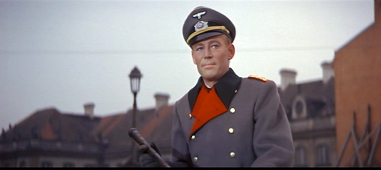
In Poland in 1942, General Tanz (Peter O'Toole) behaves like a fanatic, unnecessarily leveling an entire district of Warsaw. The General is an unyielding martinet with a perverse penchant for cleanliness and discipline. Fellow generals Kahlenberge (Donald Pleasance) and von Seidlitz-Gabler (Charles Gray) worry about Tanz's extremism -- but are mostly concerned with their own careers. They pay little attention when the lower-ranked Major Grau (Omar Sharif), a military investigator, fixates on the sex killing of a Polish prostitute. When Grau insists that an unidentified general is the murderer, he's shipped away to duty in Paris. Meanwhile, von Seidlitz-Gabler's daughter Ulrike (Joanna Pettet), rebelling against the viciousness of the war and her own priggish mother, Eleanore (Coral Browne), has an affair with Corporal Hartmann (Tom Cortenay), a staff aide to Kahlenberge. Hartmann was awarded the Iron Cross as a face-saving gesture, not for bravery: all he wants is out of the war.
Two years later in Paris, Major Grau is pleased when all three suspect Generals are together again. Even as the Allies close in he decides to re-open the murder case. This astonishes Grau's friend in the Parisian police, Inspector Morand (Philippe Noiret), but Grau stays true to his profession. Ulrike and Corporal Hartmann are briefly reunited, but Hartmann is pressed into duty to entertain the newly arrived General Tanz, who is behaving more like a maniac than ever. Both police detectives are also aware of a major plot hatching within the German general staff, which wishes to save Germany by assassinating Hitler. Even here, Kahlenberge and von Seidler-Gabler play politics. When the victory signal 'Valkyrie' comes in from the East, they rush to arrest the Gestapo and SS units around Paris.
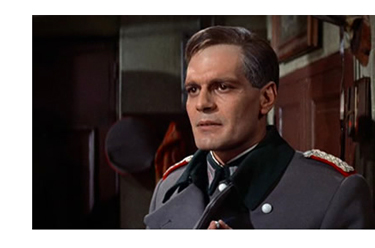
Sort of a Grand Hotel of the German High Command, The Night of the Generals pleases for its size and its interesting cast. The well-structured story balances large scenes of troop actions with intrigues in military offices, parties and various crime scenes. The part of the story set in Occupied Paris is even better. A resentful population stands by while the German officers enjoy the town. Poor Ulrike must wait alone while her lover Corporal Hartmann takes General Tanz on a search for a prostitute. For war movie buffs it all feels like familiar ground: Tanz's car passes by the Tuileries Garden, which, as we know from the René Clément epic
Is Paris Burning? faces the Hotel Le Meurice, the headquarters of the occupying Generals. Sure enough, the flags are flying out front.
There's no faulting the size of Spiegel's production. Originally from the Ukraine, co-producer Litvak secured permission to film in Warsaw, and stages a massive evacuation of part of the city, complete with Russian tanks standing in for German armor. A building is dynamited and a city block is put to the torch. The scale is just big enough to convince us that a whole city is involved, without looking outrageously wasteful.
The movie functions as a drama, but not as well as it might. A maker of unusual suspense stories like The Snake Pit and Anastasia, Anatole Litvak directs in a fairly mechanical manner. The impressive cast enacts their characters, but something about the staging seems like a dress rehearsal, as if we were watching stage directions and line readings. In one shot in the party scene in Warsaw, the main characters are simply spread across the screen in a line. It looks like a costume test. Litvak keeps his camera wide, perhaps looking for an Otto Preminger style that takes in the entire context of a scene.
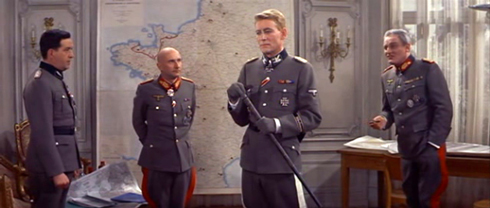
But that scheme only works if we're observing something more realistic. What we've got are a lot of mostly English actors playing dress-up. Most do it well, of course, but they're all speaking English, while the French speak French, sometimes. To play a humorless fanatic, the strong personality Peter O'Toole makes himself into a rigid monster, so racked with psychotic thoughts that he can't even walk normally. His best scene sees him visiting a cache of decadent art, to stare in increasing tension at Von Gogh's self-portrait. His face is a bundle of twitches. Tanz does this twice, like Kim Novak visiting the painting of Carlotta Valdez twice in Vertigo. We readily believe that there were mad-dog German officers with bloodless faces, walking around like psychotic zombies. But we've seen O'Toole do this before. It's as if O'Toole decided to play the most extreme scene of Lawrence of Arabia being tortured, but all the way through the movie. It also doesn't help that O'Toole's German general addresses ladies as, 'Mum.' This makes him seem more English than ever.
Omar Sharif and Tom Courtenay are reunited from Dr. Zhivago. Courtenay is again a standout while Sharif would seem an unlikely German in any circumstance. Sharif does nothing wrong, and his character becomes interesting when he carefully explains his motives to Phillppe Noiret's calm inspecteur. But it's all in the words. The logical Major Grau surprises everybody with his calm tenacity, but not a great deal of suspense arises from his pursuit of the murderer.
The killings are not shown, and neither are the dead bodies; all we learn is that they have been 'butchered' -- and that General Tanz's style of warfare on the Eastern front got him the nickname, 'Butcher.' Pettet and Courtenay romp around in bed a bit, but the film's only really adult moment comes when Pleasance's General gives Courtenay's Corporal Hartmann his instructions for entertaining Tanz for a night. He must find Tanz a woman, if that's what he wants. But if Tanz takes a liking to Hartmann, well, the Corporal is supposed to do his duty to his country. I guess there was never much of a lobby to defend the historical reputation of Nazi officers.
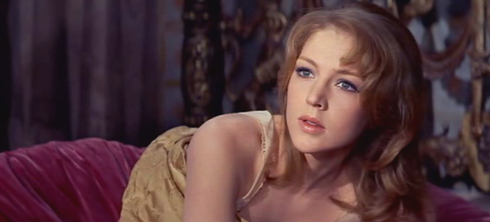
Joanna Pettet has the enviable sole romantic role, and does well considering the fact that her Ulrike is not directly involved in either the murder story or the assassination attempt. We fully expect Ulrike to be threatened as the next victim of the serial killer, but the story has a less sensationalistic agenda in mind. Most everybody else is given stock roles. Seasoned pros Donald Pleasance and Charles Gray would both play the villain Blofeld in 007 movies. Coral Browne is appropriately unpleasant as Gray's wife. John Gregson (The Battle of the River Plate) and Nigel Stock (The Great Escape) are sympathetic Generals' aides, while Gordon Jackson and Harry Andrews slip through in glorified cameos. In for just one scene is Christopher Plummer, as Field Marshall Rommel. Juliette Gréco (The Roots of Heaven) is up for even less time, although she gets to sing a bit.
The production values are a bit lopsided. Alexandre Trauner's marvelous sets are so good that we cannot readily tell which scenes are real locations and which were filmed on a back lot. We'd be fully into the movie's illusion if it weren't for the costumes, and the lighting. The costuming is never more than adequate, and Joanna Pettet's character is harmed by her nondescript clothing (and her hairstyle). She wears plain blouses and skirts that make her look more like a London schoolgirl than anything German: we learn next to nothing about her from her appearance. Trauner's sets look great night exteriors, but the interiors are all very brightly lit, even in scenes of intrigue. Even the cars General Tanz rides around in have bright interior lighting, which looks very wrong.
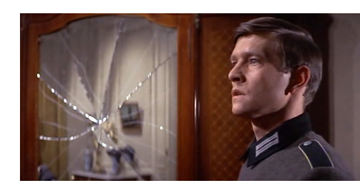
This is odd because Anatole Litvak was known for impressive atmospheres and moods in his 1940s pictures. His realistic and expressive Decision at Dawn puts us square in the middle of the chaos of Germany right at the end of the war. The Night of the Generals chooses to downplay other factors in favor of a grand narrative that jumps back and forth between the war years, and the present: 1965. The flash-forwards to 1965 take away some of the tension of the main story. Now an agent of Interpol, Philippe Noiret works to resolve Major Grau's old case. We see what's become of the generals and the aides, some of whom are prospering in the rebuilt West Germany. General Tanz is just emerging from twenty years in prison, to be given a party by his old SS comrades. We keep waiting for the movie to say something comparing the evil of mass mayhem sanctioned by war, to the nasty killings by a lone psychotic murderer. Omar Sharif's Grau understands the irony, but neither he nor Noiret's Morand draw any conclusions. Earlier in the movie, we really expect someone to stay to Major Grau, "Honestly Major, accusing someone of murder out here is like handing out speeding tickets at the Indianapolis 500." But that's another story.
It's great to catch up with yet another lavish production of the 1960s, the kind of movie that just isn't made any more. The list of stars in The Night of the Generals isn't uniformly stellar, but they're a pleasure to watch. As a last note, the show accurately depicts the attempt to kill Hitler at that military meeting, with a briefcase bomb set under the table. Hitler isn't seen. When this film's Von Stauffenburg (Gérard Buhr) shows up, with an arm and an eye missing and scars on his face, we feel like laughing again at the memory of the fashion-plate Von Stauffenberg in the wholly unnecessary Tom Cruise version.
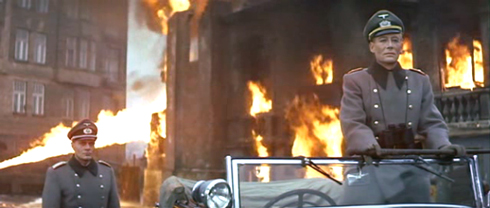
The Twilight Time Blu-ray of The Night of the Generals gives us an opportunity to enjoy this lavish show in a terrific presentation. Big movies made before computer generated imagery give pleasure just from their 'bigness,' and the Panavision images here have been well preserved. The title sequence shows a variety of war medals against black, with an innovative treatment -- they keep popping in and out of a distortion effect, which is perhaps meant to represent the hidden madness.
A big plus is Maurice Jarre's music score, which is happily available to be heard on a second Isolated Score track. Composer Jarre had just scored Is Paris Burning?, the music for which is much more memorable. The final cue hangs out over black for a minute or so, as exit music. The feature soundtrack is uncompressed monaural.
A trailer is included, as well as Julie Kirgo's welcome liner notes. We learn that producer Spiegel was very 'hands-on,' during the film, imposing big production values. The interference may have been why director Litvak let many scenes play out as a pageant instead of going for suspenseful details. Kirgo also tells us that the screenplay was assembled with elements from two separate books. She too admits to being partial to big-star productions of the 1960s.

On a scale of Excellent, Good, Fair, and Poor,
The Night of the Generals Blu-ray rates:
Movie: Good
Video: Excellent
Sound: Excellent (mono)
Supplements: Isolated Score Track, Trailer, Julie Kirgo liner notes
Deaf and Hearing Impaired Friendly?
YES; Subtitles: English
Packaging: Keep case
Reviewed: June 15, 2015

Text © Copyright 2015 Glenn Erickson
See more exclusive reviews on the Savant Main Page.
Reviews on the Savant main site have additional credits information and are often updated and annotated with reader input and graphics.
T'was Ever Thus.
Return to Top of Page
|

